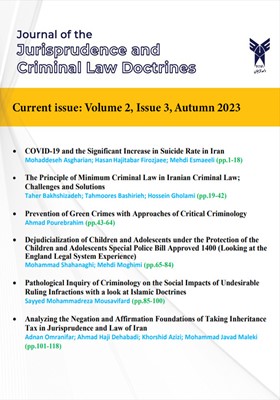The Principle of Minimum Criminal Law in Iranian Criminal Law; Challenges and Solutions
Subject Areas :
Jurisprudence and Criminal Law Doctrines
Taher Bakhshizadeh
1
,
Tahmoores Bashirieh
2
*
,
Hossein Gholami
3
1 - PhD student of criminal law and criminology, Ardabil Branch, Islamic Azad University, Ardabil, Iran.
2 - Assistant Professor. Department of Law, Allameh Tabatabai University, Tehran, Iran
3 - Professor , Department of Law. Allameh Tabatabai University, Tehran, Iran.
Received: 2023-07-12
Accepted : 2023-09-10
Published : 2023-09-23
Keywords:
abolitionism,
principle of minimum criminal law,
minimum criminalization,
challenges of minimum criminalization,
Abstract :
Receive Date: 2023/07/12 Revise Date: 2023/08/20 Accept Date: 2023/09/10
Abstract
The principle of minimum criminal law arises from the philosophical theory of liberalism and develops the minimum criminal law in different form. The principle of minimum criminal law with respect to human beings and values such as their freedom, autonomy and right to be different and expression of the minimum role of the State and lack of its right to intervene in all aspects of human life, describes the criminal law that its scope is little and limited to essential elements. According to this principle, governments should justify the criminalization and then sanctions. The implementation of this principle faces obstacles and challenges such as: the more intervention than necessity of the country's judicial system in social conflicts, legal inflation, lack of effective protection of individual rights, a high level of conviction rate and systemic problems. To overcome these problems, we must review the principles of the penal system. The principle of minimum criminal law has effects that, based on this principle, it is possible to overcome the challenges and obstacles related to the reduction of criminal titles in Iranian criminal law. This principle takes into account the tools and requirements necessary to realize minimum criminal rights.
References:
آشوری، محمد (1382)، جایگزینهای زندان یا مجازاتهای بنیابین، تهران، نشر گرایش.
آنسل، مارک (1391)، دفاع اجتماعی، ترجمه: محمدآشوری و علی حسین نجفی ابرندآبادی، تهران، کتابخانه گنج دانش.
جلیلیان، مصطفی (1395)، بررسی زمینههای جرم زدایی در حقوق کیفری ایران، پایان نامه کارشناسی ارشد، دانشگاه بینالمللی قزوین.
حبیب زاده، محمد جعفر (1379)، محاربه در حقوق کیفری ایران، تهران، انتشارات دانشگاه تربیت مدرس.
دلماس مارتی، میری (1388)، نظامهای بزرگ سیاست جنایی، ترجمه: علیحسین نجفی ابرند آبادی، تهران، نشر میزان.
رایجیان اصلی، مهرداد (1381)، تبیین استراتژی عقب نشینی یا تحدید دامنه مداخله حقوق جزا و جایگاه آن در ایران، مجله قضایی و حقوقی دادگستری، شماره: 41.
روبرکاری، یو (1381)، مداخله روان شناختی اجتماعی زودرس در پیشگیری از رفتارهای مجرمانه، ترجمه: علی حسین نجفی ابرندآبادی، تحقیقات حقوقی، شماره: 35 و 36.
سلطان فر، غلام رضا (1381)، تورم کیفری، پایان نامه کارشناسی ارشد، دانشگاه شهید بهشتی.
سمیعی عارف، زهرا (1390)، اصل حداقل بودن حقوق جزا، پایاننامه کارشناسی ارشد، دانشگاه علامه طباطبایی.
غلامی، حسین (1391)، اصل حداقل بودن حقوق جزا، فصلنامه حقوق کیفری، شماره: 2.
غلامی، حسین (1393)، اصل حداقل بودن حقوق جزا، تهران، نشر میزان.
قلعهوند، محمد (1395)، جلوههای کیفرزدایی در قانون مجازات اسلامی مصوب 1392، پایاننامه کارشناسی ارشد، دانشگاه پیام نور کرج.
کاتوزیان، ناصر (1379)، جایگاه قانونی مجمع تشخیص مصلحت نظام، چشمانداز ایران، شماره: 7.
کلانتری، کیومرث (1379)، اصل قانونی بودن جرائم و مجازاتها، مازندران، دانشگاه مازندران.
گلدوزیان، ایرج (1381)، بایستههای حقوق جزای عمومی، تهران، نشر میزان.
گودرزی، محمدرضا (1380)، تورم قوانین کیفری در ایران و لزوم جرم زدایی، پایاننامه کارشناسی ارشد، دانشگاه تهران.
میرزایی، مریم (1397)، جایگاه اصل حداقل بودن حقوق جزا در پرتو اسناد حقوق بشر وحقوق کیفری ایران، مجله کانون وکلای دادگستری اردبیل، شماره: 5.
نوبهار، رحیم (1393)، اصل کاربرد کمینه حقوق کیفـری، تهران، نشر میزان.
ویلم، دهان (1387)، الغاءگرایی و کنترل جرم: تناقض در اصطلاحات، ترجمه: حسین غلامی، پژوهش حقوق و سیاست، شماره: 24.
هوساک، داگلاس (1390)، جرمانگاری افراطی، ترجمه: محمد تقی نوری، تهران، نشر مجد.
Ashworth, Andrew (1999), Principles of Criminal Law, Oxford: Oxford University Press.
Bourdieu, Pierre (1980), Le sens pratique. Paris: Éditions de Minuit.
23.Braithwaite, John, Pettit, Philip (1990), Not just deserts, a Republican Theory of Criminal Justice, Oxford: Clarendon press.
Delms-Marti, Mireille (1992), Modelos e Movimentos de Política Criminal. Rio de Janeiro: Revan.
Durkheim, Émile (1977), Les Règles de la Méthode Sociologique. Paris: PUF.
Husak (2008), Douglas Criminalization, the Limits of the Criminal law, Oxford: Oxford University Press.
Garcia, M (2014), La géométrie normative variable des droits de la personne présents dans le système de droit criminel, 38 Déviance et Société 361.
Jarborg, Nils (2004), Criminalization Last Resort ultimaratio, Ohio State Journal of Criminal Law, Vol 2.
Monstrosity, and the Logic of Practice, 55(4) McGill Law Journal 771-817.
Pires, A (2001), La rationalité pénale moderne, la société du risque et la judiciarisation de l’opinion publique, 33 Sociologie et Sociétés 179.
Scott, David (2008), penology, London: sage Publications.
Sylvestre, M.-E (2013), The rediscovery of the proportionality principle in Ipeelee and the emergence of collective responsibility, 63 (2d) S.C.L.R. 461-481.
Sylvestre, M.-E (2010), Rethinking Criminal Responsability for Poor Offenders: Choice.
Swaaningen, Rene van, & Bianchi, H (1986), Abolitionism: Towards a Non-Repressive Approach to Crime, Amsterdam: Free University Press.
_||_

